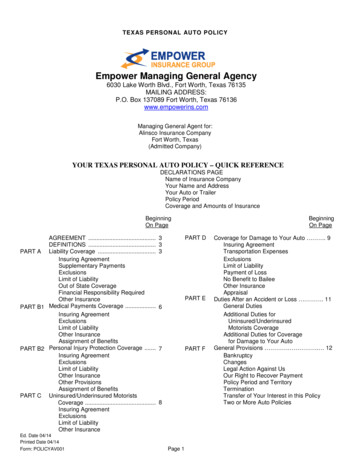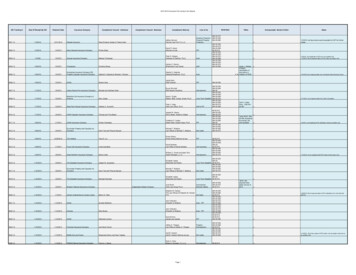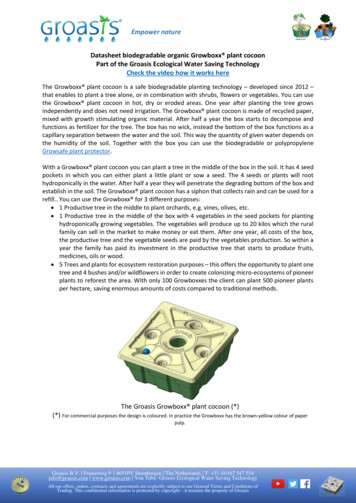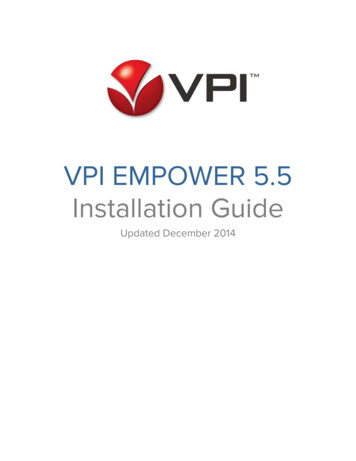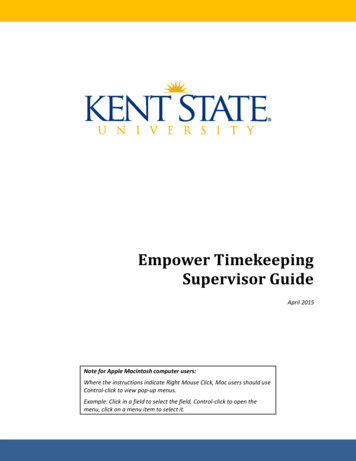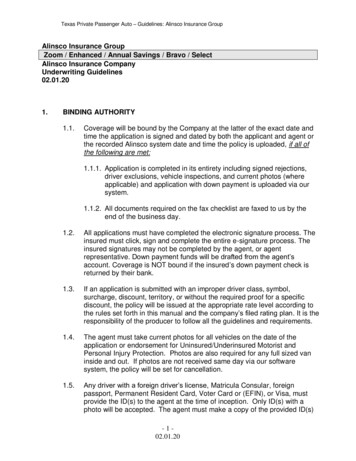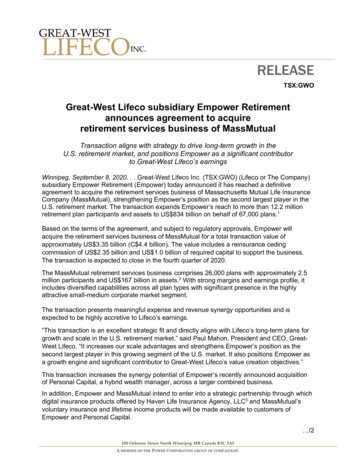
Transcription
YOURINSUREDFUNDSNational Credit Union AdministrationOffice of Consumer Financial ProtectionMyCreditUnion.gov
The National Credit Union Administration(NCUA) operates the National Credit Union ShareInsurance Fund (NCUSIF) to protect accounts atfederally insured credit unions up to 250,000.The 250,000 in coverage applies to each shareowner, per insured credit union, for each accountownership category.This booklet provides examples of insurancecoverage under the NCUA’s rules.Because the scope of this booklet is limited, creditunion members should contact their federallyinsured credit unions or the NCUA’s Office ofConsumer Financial Protection for further shareinsurance coverage details about situations notaddressed in this booklet.Contact information for the Office of ConsumerFinancial Protection is available on the backcover of this booklet. Members or their counselmay also wish to consult the NCUA Rules andRegulations relating to share insurance coveragepublished in the Code of Federal Regulations (12C.F.R. Part 745). Also, you can find the NCUA’sinsurance regulations at ncua.gov. Additionalinformation about share insurance coverage isavailable at MyCreditUnion.gov.The Federal Credit Union Act and the NCUA ruleson share insurance coverage control how accountswill be insured at each federally insured creditunion. No persons may imply a federally insuredcredit union can offer coverage that differs fromthis formal structure.Also, members should review their accountsperiodically and whenever they open newaccounts or modify existing accounts to ensurethat all their funds remain insured.1
2
FORWARDThe purpose of this booklet is to help youunderstand your share insurance protection.The NCUA is an independent agency of the U.S.Government. The NCUA regulates, charters,and insures the nation’s federal credit unions. Inaddition, the NCUA insures state-chartered creditunions that seek and qualify for federal insurance.In most states, state law requires state charteredcredit unions to be federally insured.The shares in your credit union are insuredby the National Credit Union Share InsuranceFund (NCUSIF), which is backed by the full faithand credit of the U.S. Government. Establishedby Congress in 1970 to insure member shareaccounts at federally insured credit unions, theNCUSIF is managed by the NCUA under thedirection of its three-person Board.Your share insurance coverage is similar to thedeposit insurance coverage offered by the FederalDeposit Insurance Corporation (FDIC).Credit unions that are insured by the NCUSIF mustdisplay in their offices the official NCUA insurancesign, which appears on the cover of this booklet.All federal credit unions must be insured bythe NCUA, and no credit union may terminateits federal insurance without first notifying itsmembers.Here are some important facts to rememberabout your share insurance coverage:No member of a federally insured credit unionhas ever lost one penny of insured savings.3
The NCUSIF has several programs to helpinsured credit unions that might be experiencingproblems. Liquidations or failures are a last resort.In the rare instances when a federally insuredcredit union does fail, the NCUA will make anynecessary payouts to the credit union’s members.These payouts are usually made within 3 daysfrom the time the credit union closes its doors.As a member of a federally insured credit union,you do not pay directly for your share insuranceprotection. Your credit union pays a deposit andan insurance premium when required into theNCUSIF based on the total amount of insuredshares and deposits in the credit union. Insuredcredit unions are required to deposit and maintainone percent of their insured shares and depositsin the NCUSIF.4
TABLE OF CONTENTSSHARE INSURANCE COVERAGE.7FREQUENTLY ASKED QUESTIONS.9APPENDIX.21SINGLE OWNERSHIP ACCOUNTS.22JOINT ACCOUNTS .26REVOCABLE TRUST ACCOUNTS .33ACCOUNTS HELD BY EXECUTORSOR ADMINISTRATORS .45ACCOUNTS HELD BY A CORPORATION,PARTNERSHIP OR UNINCORPORATEDASSOCIATION .46ACCOUNTS HELD BYGOVERNMENT DEPOSITORS .48TRUST ACCOUNTS ANDRETIREMENT ACCOUNTS .53MORE INFORMATION FROM THE NCUA.595
6
SHARE INSURANCE COVERAGEProperly established share accounts in federallyinsured credit unions are insured up to 250,000.Generally, if a credit union member has morethan one account in the same credit union ofthe same ownership, those accounts are addedtogether and insured in the aggregate. There areexceptions though. You may obtain additionalseparate coverage on multiple accounts, but onlyif you have different ownership interests or rightsin different types of accounts and you properlycomplete account forms and applications.For example, if you have a single ownershipregular share account and an IndividualRetirement Account (IRA) at the same creditunion, the regular share account is insured upto 250,000 and the IRA is separately insuredup to 250,000. However, if you have a regularshare account, a share certificate, and a sharedraft account, all in your own name and withoutany beneficiaries, you will not have additionalcoverage. Those accounts will be added togetherand insured up to 250,000 as your individualaccount. Additionally, shares denominated inforeign currencies are insured as outlined in theNCUA Rules and Regulations.Coverdell Education Saving Accounts (or 529Accounts), formerly education IRAs, are insuredas irrevocable trust accounts and will be added toa member’s other irrevocable trust accounts andinsured up to 250,000.Roth IRAs will be added together with traditionalIRAs and insured up to 250,000. You may alsoqualify for additional coverage on revocable trust(formal or informal commonly referred to aspayable on death) accounts.7
A co-owner’s interest in all joint accounts in thesame credit union will be added together andinsured up to the maximum of 250,000.8
FREQUENTLY ASKED QUESTIONSABOUT THE NATIONAL CREDITUNION SHARE INSURANCE FUND1. Which credit unions are insured by theNCUSIF?The NCUSIF insures member shares in all federalcredit unions and those federally insured, statechartered credit unions that apply for and meetthe insurance standards. Insured credit unions arerequired to indicate their insured status in theiradvertising and to display the official NCUSIF signat their offices and branches.Some state-chartered credit unions may beinsured by private insurance or guarantycorporations. This coverage is separate and apartfrom the NCUSIF and is not backed by the full faithand credit of the U.S. Government.2. How does the NCUSIF protect credit unionmembers against loss?Each credit union approved for NCUSIF coveragemust meet high standards of safety and soundnessin its operations. Federal and state examiners,as appropriate, conduct regular examinations todetermine whether federally insured credit unionsare following these standards. If an insured creditunion gets into financial difficulties and must beclosed, the NCUSIF acts immediately to protecteach member’s share accounts.3. Does the NCUSIF protection apply only if acredit union is liquidated?No. Liquidation is the only situation in which amember is directly provided share insuranceprotection by the payment of a check for his orher insured savings. However, indirect protection9
is provided when the NCUA Board, through theNCUSIF, authorizes financial assistance to a creditunion to enable it to overcome a temporaryfinancial setback.In a case where a credit union is unable toovercome its difficulty, financial assistance maybe authorized to assist its members in continuingto receive credit union service at anotherinsured credit union through either a merger oracquisition.4. How does NCUSIF pay members their shareswhen an insured credit union is liquidated?Checks for each member’s shares (less anyamounts due on outstanding loans) up to theinsurance limit are mailed to the member’s lastknown address as shown in the records of thecredit union. These checks are usually mailedwithin 3 days after the credit union is placed intoliquidation. In situations where on-site payment ismore convenient, the NCUA liquidation team willgive checks directly to members.5. What happens to the member’s share accountwhen an insured credit union is merged intoanother insured credit union?Each member’s share account is transferred to thecontinuing credit union. Accrued dividend creditsare also transferred. On the effective date of themerger, each merging credit union member hasfull membership rights to all the financial servicesprovided by the continuing credit union.6. Does the NCUSIF protect the interests ofcreditors?No. The NCUSIF protects only credit unionmembers.10
FREQUENTLY ASKED QUESTIONSABOUT GENERAL SHAREINSURANCE COVERAGE7. What is the Standard Maximum ShareInsurance Amount?The Standard Maximum Share Insurance Amountfor a credit union member is 250,000. Shareaccounts maintained in different rights orcapacities, or forms of ownership, may each beseparately insured up to the 250,000 standardmaximum, or in the case of certain retirementaccounts, up to 250,000. Thus, a membermay hold or have an interest in more than oneseparately insured share account in the sameinsured credit union.8.What types of accounts are insured?All types of member share accounts and depositsreceived by the credit union in its usual courseof business, including regular shares (savingsaccounts), share certificates, and share draftaccounts (checking accounts) are insured.Investment products offered by a credit union toits members, such as mutual funds, annuities, andother non-deposit investments are not insured bythe NCUSIF.9. Is the NCUSIF coverage increased by placingfunds in two or more of the same kind ofshare accounts in the same credit union?No. The NCUSIF coverage is not increased merelyby dividing funds owned by the same personor persons into one or more of the differentkinds of share accounts available. For example, aregular share account, a share draft account anda share certificate account owned by the same11
member with no beneficiaries are added togetherand insured up to 250,000. Insurance can beincreased by opening a different type of account- one that is held in a different right and capacity.For example, insurance on a single ownershipaccount is separate from insurance on a jointaccount.10. If a member has accounts in several differentinsured credit unions, will the accounts beadded together for the purpose of insurancecoverage?No. The NCUSIF coverage is applied to shareaccounts in each insured credit union. A memberwho has share accounts in two or more differentinsured credit unions would have coverage up tothe full insurable amount in each credit union.In the case of a credit union having one or morebranches, the main office and all branch officesare considered as one credit union.FREQUENTLY ASKED QUESTIONSABOUT INSURANCE FORINDIVIDUAL AND JOINTACCOUNTS11. If a member has more than one individualaccount in the same insured credit union, iseach account insured to 250,000?No. Individual share accounts held by the samemember are added together and are insured upto 250,000. An individual share account is anaccount solely owned by one individual, withoutbeneficiaries, and the right of withdrawal byanother individual. IRA and Keogh accounts areinsured separately.12
12. What types of joint accounts may be insured?The NCUSIF covers joint accounts owned in anymanner conforming with applicable state lawsuch as joint tenants with a right of survivorship,tenants by the entireties, tenants in common,or an account owned by a husband and wife ascommunity property in states recognizing thisparticular form of joint ownership.13. If two or more persons, such as husband andwife, have a joint account in the same creditunion as well as their own individual accounts,is each account separately insured?Yes. A person’s interest in joint accounts areinsured separately up to 250,000, providedeach co-owner has personally signed an accountsignature card and has a right of withdrawal onthe same basis as the other co-owners.1However, the insurance protection for a co-owneron joint accounts is not increased by rearrangingthe names of the owners, changing the style ofnames, or by establishing more than one jointaccount. The interests that a particular co-ownerhas in all joint accounts held in the same creditunion will be added together and insured up to 250,000.14. Does the standard maximum of 250,000apply if funds in the individual and jointaccounts of husband and wife all consist ofcommunity property?Yes. In those jurisdictions recognizing communityproperty, community funds may be maintainedin accounts in the individual names of eachspouse or a joint account in the names of both.If state law limits a minor’s right of withdrawal, the accountwill still be insured as a joint account. The signature of eachco-owner is not required on a share certificate.113
The individual account of the husband and theindividual account of the wife will each be insuredup to 250,000. As co-owners, the interest of thehusband and wife in the joint account will each beinsured up to 250,000.FREQUENTLY ASKED QUESTIONSABOUT SPECIAL ACCOUNTS15. What is the NCUSIF coverage on a trustaccount held under the provisions of anirrevocable express trust?The trust interest of a beneficiary in a validirrevocable trust, including Coverdell EducationSavings Accounts (or 529 Accounts), if capableof evaluation in accordance with publishedrules, is insured up to 250,000 separately fromthe individual accounts of the settlor (grantor),trustee, or the beneficiary. Either the settlor or thebeneficiary must be a member to obtain insurancebenefits. All trust interests created by the samesettlor (grantor) in the same credit union for thesame beneficiary will be added together andinsured in the aggregate to 250,000.16. What is the insurance coverage on a revocabletrust account, a tentative or “Totten” trustaccount, a “payable-on-death” (POD) / “intrust for” (ITF) account, or a qualifying livingtrust account?These accounts, or any similar accounts whichdocument the owner’s intention to have the fundspass on to a named beneficiary after the ownerdies, are considered revocable trust accounts. Thefunds in such accounts are insured for the owner,also known in formal trusts as settlor or grantor,up to 250,000 for each beneficiary separatelyfrom any other individual accounts of the owner.14
If the beneficiary is not a natural person orcharitable organization or other non-profit entityunder the Internal Revenue Code of 1986, thefunds in the account that are attributable to thatbeneficiary are treated as an individually ownedaccount of the owner, aggregated with any otherindividual accounts of the owner, and insuredup to 250,000. In the case of a revocable trustaccount, the person who holds the power ofrevocation is deemed to be the owner of thefunds in the account.17. What is the insurance coverage on a jointrevocable trust account?A joint revocable trust account is a revocable trustaccount, as described above, that is established bymore than one owner and held for the benefit ofothers, some or all of whom are natural personsor a charitable organization or other non-profitentity under the Internal Revenue Code of1986. The respective interests of each co-ownerheld for the benefit of each beneficiary will beseparately insured up to 250,000. The interestof each co-owner will be deemed equal unlessotherwise stated in the share account records ofthe federally insured credit union. Interests heldfor beneficiaries other than those described abovewill be added to the individual accounts of theco-owners.When a husband and a wife establish a revocabletrust account naming themselves as the solebeneficiaries, the account will not be insured as ajoint revocable trust account, but will instead beinsured as a joint account.15
18. Is a co-owner on a revocable trust accountinsured if they are not a member in their ownright?No. A revocable trust co-owner needs to be amember of the credit union for that owner’srespective interest in the revocable trust funds tobe insured. As such, any co-owner that is not amember of that credit union is not insured.19. Is the interest in an employee benefit accountinsured any differently than a member’sindividual account?Yes. For insurance purposes, employee benefitaccounts are insured separately. The ascertainableinterest of each participant in such account isinsured up to the 250,000 maximum separatelyfrom other accounts.20. May a person receive separate insuranceon each of several employee benefit plansestablished by the member’s employer withthe same credit union?No. If two or more employee benefit plansare established by an employer for the sameindividual, at the same credit union, thebeneficiary’s interest in the two accounts will beadded together and insured up to the 250,000standard maximum.21. What insurance coverage is provided fortraditional IRAs, Roth IRAs, and Keoghaccounts?Traditional IRAs, Roth IRAs, and Keogh accountsare insured up to 250,000, separately from otheraccounts that the member maintains in the samecredit union. However, a member’s Roth IRA willbe added together with his or her traditional IRA16
and insured in the aggregate to the maximum ofup to 250,000. A Keogh account is separatelyinsured from the IRA accounts up to 250,000.22. Are accounts held by a person as executor,administrator, guardian, custodian, or insome other similar fiduciary capacity insuredseparately from his individual account?Yes. If the records of the credit union indicate thatthe person is depositing the funds in a fiduciarycapacity, such funds would be separately insuredfrom the fiduciary’s individually owned account.23. When an account is designated as held by aperson as agent for the owner of the funds,how is the account insured?The account is insured as an account of theprincipal or true owner. The funds in the accountare added to any other individual account ownedby the owner and the total is then insured up to 250,000.24. Is an account held by a corporation,partnership, or unincorporated associationinsured separately from the individualaccounts of the stockholders, partners, ormembers?Yes. If the corporation, partnership, orunincorporated association has obtainedmembership in the credit union and is engaged inan independent activity, its account is separatelyinsured to 250,000. The term “independentactivity” means an activity other than onedirected solely at increasing share insurancecoverage.17
OTHER FREQUENTLY ASKEDQUESTIONS25. Can a federal credit union terminate itsNCUSIF coverage?No. A federal credit union cannot be charteredor retain its charter unless it is insured by theNCUSIF.26. Can a state credit union terminate itsparticipation in the NCUSIF?Yes. A state-chartered credit union can terminateits NCUSIF coverage in some states, but it mustobtain the approval of its members and the NCUA.In other states, state-chartered credit unionsare required to have federal insurance providedby the NCUSIF. The NCUA’s share insurance isthe only share insurance backed by the full faithand credit of the U.S. Government. When astate credit union converts its share insuranceto another licensed share insurance program,NCUSIF coverage terminates upon conversion.If the state credit union does not provide foranother share insurance program, NCUSIFcoverage remains in effect for one year followingthe effective date of termination, but coveragemay be reduced depending upon account activityduring the one year period.27. What publications covering the operations ofthe NCUSIF are available?The NCUA publi
Your share insurance coverage is similar to the deposit insurance coverage offered by the Federal Deposit Insurance Corporation (FDIC). Credit unions that are insured by the NCUSIF must display in their offices the official NCUA insurance sign, which appears on the cover of t
